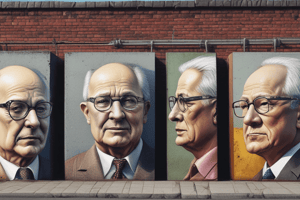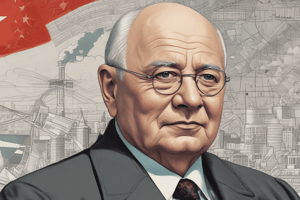Podcast
Questions and Answers
What was the primary goal of Perestroika under Gorbachev's leadership?
What was the primary goal of Perestroika under Gorbachev's leadership?
- To encourage market-oriented economic solutions (correct)
- To restrict international relations
- To maintain centralized control over the economy
- To establish a closed and secretive society
How did Gorbachev's introduction of political reforms impact the Soviet Union?
How did Gorbachev's introduction of political reforms impact the Soviet Union?
- It isolated the Soviet Union from global affairs
- It led to the establishment of a dictatorship
- It increased military control over the government
- It transformed the Soviet Union into a multi-party state (correct)
Which term translates to 'restructuring' and symbolizes openness and transparency in the Soviet society?
Which term translates to 'restructuring' and symbolizes openness and transparency in the Soviet society?
- Glasnost (correct)
- Isolation
- Secrecy
- Stagnation
What was a key aspect of Perestroika's economic approach?
What was a key aspect of Perestroika's economic approach?
How did Gorbachev's policies impact the Soviet Union's international relations?
How did Gorbachev's policies impact the Soviet Union's international relations?
Which period marked Gorbachev's leadership as the final General Secretary of the Communist Party of the Soviet Union?
Which period marked Gorbachev's leadership as the final General Secretary of the Communist Party of the Soviet Union?
What was the name of the series of documents released by Mikhail Gorbachev in 1990?
What was the name of the series of documents released by Mikhail Gorbachev in 1990?
Which event ultimately ended the Cold War, as mentioned in the text?
Which event ultimately ended the Cold War, as mentioned in the text?
What did Mikhail Gorbachev admit to in his Glebovka Speech?
What did Mikhail Gorbachev admit to in his Glebovka Speech?
Which term refers to Gorbachev's policies that drove the transformation of the Soviet Union?
Which term refers to Gorbachev's policies that drove the transformation of the Soviet Union?
What major event occurred in December 1991, as stated in the text?
What major event occurred in December 1991, as stated in the text?
How did Gorbachev's policies impact the geopolitical landscape according to the text?
How did Gorbachev's policies impact the geopolitical landscape according to the text?
Flashcards are hidden until you start studying
Study Notes
Gorbachev: A Man of Change
Mikhail Sergeyevich Gorbachev was born on March 2, 1931, in Privolnoye, Stavropol Krai, Russia. He would later become one of the most significant figures in modern history due to his role as the final leader of the Soviet Union during a period of radical change. His tenure as General Secretary of the Communist Party of the Soviet Union from 1985 to 1991 saw the implementation of two key policies that would forever alter the course of international relations and global politics: Perestroika and Glasnost.
Perestroika
Understanding the concept of 'perestroika' is essential to understanding Gorbachev's era. It translates to "restructuring," indicating a movement towards openness and transparency in Soviet society and the economy. This policy aimed to improve efficiency by encouraging more market-oriented economic solutions while maintaining some aspects of centralized control. Gorbachev believed that this approach would help modernize the country and strengthen its position internationally.
Political Reforms
In addition to economic changes, Gorbachev also pursued political reforms with great determination and success. He introduced substantial changes that transformed the Soviet Union into a multi-party state. In 1990, he released a series of documents known as the "New Union Treaty." These treaties were intended to create a confederation involving all fifteen republics of the USSR, including a new federal parliament called the Congress of People's Deputies.
Collapse of the Soviet Union
These far-reaching changes came at a price. The liberalization of the Soviet system led to the disintegration of the Eastern Bloc and ultimately ended the Cold War. The changes he implemented fundamentally altered the geopolitical landscape and ushered in a new era of international cooperation. However, these same factors also contributed to the dissolution of the Soviet Union itself, which occurred in December 1991 after several years of growing tensions between various regional leaders within the country.
Glebovka Speech
One of the most defining moments of Gorbachev's leadership was his speech at Glebovka, where he admitted the Soviet Union had committed many mistakes throughout its existence and acknowledged it needed to be improved. This speech signified a major shift away from the traditional Soviet stance of never admitting errors.
Conclusion
Mikhail Gorbachev remains a prominent figure in world history due to his role in driving the transformation of the Soviet Union through his policies of perestroika and glasnost. Despite the challenges and controversies associated with his time in power, there can be little doubt that his legacy has shaped the world we live in today.
Studying That Suits You
Use AI to generate personalized quizzes and flashcards to suit your learning preferences.




